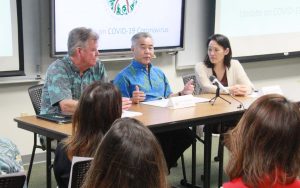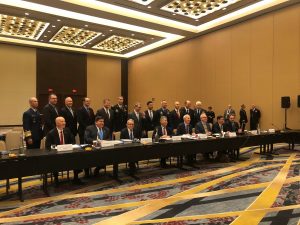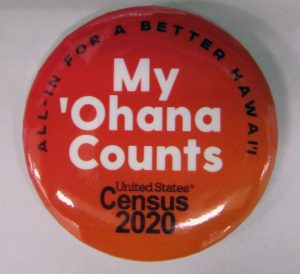Hawai’i responds to COVID-19, prepares for census
Posted on Feb 26, 2020 in Capitol Connection, FeaturedWhile Washington, D.C. still deals with political acrimony and gridlock, the nation’s governors are finding ways to work together — led, in part, by Governor Ige and Governor Asa Hutchinson of Arkansas. Read about how the states are carving their own path to bi-partisanship, Hawai‘i’s monitoring of the coronavirus (COVID-19), support for the Joint Legislative Package to help working families, and plans for the New Aloha Stadium Entertainment District.

Governor Ige with state Department of Health director Bruce Anderson and epidemiologist Sarah Park at a recent news conference on COVID-19.
Q. What’s the latest on the state’s response to the coronavirus?
A. Everyone should know we’re ready and prepared to deal with the situation. We’re in constant contact with our federal, county and local healthcare partners to protect our residents and visitors. Everyone needs to stay informed and take preventive measures to keep our community safe. When I was in Washington, D.C., the governors were briefed by the Centers for Disease Control. I made sure the CDC understood that because of Hawai‘i’s isolation, it’s important that we can test for COVID-19 ourselves to quickly identify the virus and take action to isolate anyone who could be infected.

A meeting of the Council of Governors in Washington, D.C. with co-chairs Gov. Ige and Gov. Hutchinson.
Q. What was covered in your meetings in Washington, D.C. and Japan?
A. There was clear consensus among both Democrats and Republicans that the National Governors Association (NGA) shouldn’t get mired in the confrontations that have dominated D.C. As the co-chair of the Council of Governors, I pushed to create bi-partisan teams of governors to work on priority issues. We’re concerned that National Guard funding not be diverted to build a border wall between Mexico and the U.S. I also met with several cabinet members to make sure Hawai‘i is well-positioned to take advantage of federal funding and other opportunities. In Japan, we met to make progress on visitor pre-clearance. I also reinforced our commitment to ensuring safe access to the Thirty Meter Telescope site and that we’re working on broader issues of reconciliation with the Hawaiian people.
Q. The Joint Legislative Package is making its way through the session. Why are these bills such a priority?
A. We wanted to make significant progress in reducing the cost of living and realized it would take addressing several areas to make a difference. The bills provide for two of the biggest expenses in a family’s budget — the cost of housing and childcare — while raising the minimum wage and providing targeted tax relief.
Q. The 2020 Census gets under way in March. Why is a complete count for the state so important?
A. An accurate count really does mean more resources for our state. In the past, we’ve lost millions of federal dollars because Hawai‘i has been undercounted. People shouldn’t be concerned that the information will be used to negatively impact anyone. It can help us receive our fair share of funding and guide future planning.
Q. What makes the plans for the new Aloha Stadium Entertainment District especially promising?
A. There are a lot of opportunities for sports and entertainment activities, housing development, hotels, and retail businesses. The parcel is right on the rail line, virtually in the middle of the island. The real key will be how we can structure the public-private partnership to help pay for the stadium construction and maintenance.
